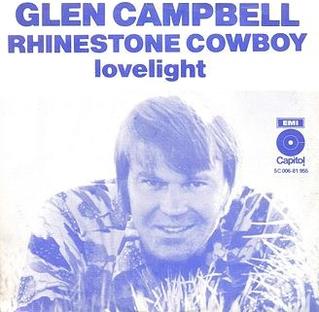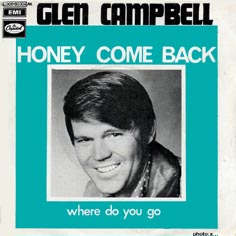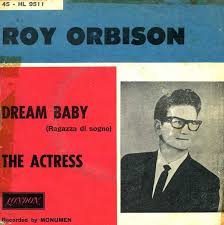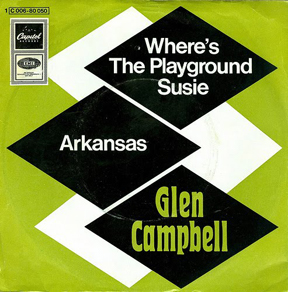Related Research Articles

Bobbie Gentry is a retired American singer-songwriter, who was one of the first female artists in America to compose and produce her own material.

"Me and Bobby McGee" is a song written by American singer-songwriter Kris Kristofferson and originally performed by Roger Miller. Fred Foster shares the writing credit, as Kristofferson wrote the song based on a suggestion from Foster. A posthumously released version by Janis Joplin topped the U.S. singles chart in 1971, making the song the second posthumously released No. 1 single in U.S. chart history after "(Sittin' On) The Dock of the Bay" by Otis Redding. Gordon Lightfoot released a version that reached number 1 on the Canadian country charts in 1970. Jerry Lee Lewis released a version that was number 1 on the country charts in December 1971/January 1972 as the "B" side of "Would You Take Another Chance On Me." Billboard ranked Joplin's version as the No. 11 song for 1971.

"Gentle on My Mind" is a song that was written and originally recorded by John Hartford, and released on his second studio album, Earthwords & Music (1967). Hartford composed the song after watching Doctor Zhivago in 1966, as he was inspired by the film and his own personal experiences. The lyrics describe the reminiscences of lost love of a man as he travels through the country. The following year, Hartford released the song as a single on RCA Records.

"Rhinestone Cowboy" is a song written by Larry Weiss and recorded by American country music singer Glen Campbell. When released on May 26, 1975, as the lead single and title track from his album Rhinestone Cowboy, it enjoyed huge popularity with both country and pop audiences.

"Sundown" is a song by Canadian folk artist Gordon Lightfoot, from the titular album, released as a single in March 1974.

"It's Only Make Believe" is a song written by drummer Jack Nance and Mississippi-born singer Conway Twitty, while both were touring across Ontario, Canada in 1958. The song was recorded on May 7 for MGM Records; produced by Jim Vienneau, it featured Floyd “Lightnin’” Chance on double bass. It was released on side B of "I'll Try" on July 14, 1958. Known as Harold Lloyd Jenkins until changing his name in 1957, Twitty was a relatively unknown rock n' roll singer at the time. That all changed when side B finally hit the chart in September, then made No. 1 twice, on November 10 and 24. The single topped both U.S. and the UK Singles Chart, and became the only No. 1 pop single of his career. Years later, on a segment of 'Pop Goes The Country', Twitty stated it was a hit in 22 countries, and sold over 8 million copies. He did not become a country music star until he crossed over in 1966.

"Let It Be Me" is a popular song originally published in French in 1955 as "Je t'appartiens" interpreted by Gilbert Bécaud. It became popular worldwide with an English version by the Everly Brothers and later with the duet by Betty Everett and Jerry Butler.
"Together Again" is a 1964 song by United States country singer and guitarist Buck Owens.
"By the Time I Get to Phoenix" is a song written by Jimmy Webb. Originally recorded by Johnny Rivers in 1965, it was covered by American country music singer Glen Campbell on his album of the same name. Released on Capitol Records in 1967, Campbell's version topped RPM's Canada Country Tracks, reached number two on Billboard's Hot Country Singles chart, and won two awards at the 10th Annual Grammys. Broadcast Music, Inc. (BMI) named it the third most performed song from 1940 to 1990. The song was ranked number 20 on BMI's Top 100 Songs of the Century. Frank Sinatra called it "the greatest torch song ever written." It was No. 450 on Rolling Stone magazine's Top 500 Songs of All Time.
"Little Green Apples" is a song written by Bobby Russell that became a hit for three different artists, with their three separate releases, in 1968. Originally written for and released by American recording artist Roger Miller, "Little Green Apples" was also released as a single by American recording artists Patti Page and O. C. Smith that same year. Smith's version became a #2 hit on both the Billboard Hot 100 and Billboard Hot Rhythm & Blues Singles charts, while Miller's version became a Top 40 hit on the Hot 100 as well as the UK Singles Chart. Page's version became her last Hot 100 entry. The song earned Russell a Grammy Award for Song of the Year and for Best Country Song. In 2013, "Little Green Apples" was covered by English recording artist Robbie Williams featuring American recording artist Kelly Clarkson, which became a top 40 hit in Mexico.
"Funny How Time Slips Away" is a song written by Willie Nelson and first recorded by country singer Billy Walker. Walker's version was issued as single by Columbia Records in June 1961 and peaked at number 23 on the Hot C&W Sides chart. The song would go on to be featured in several live action films and shows, such as in the first episode of the second season of AMC’s “Better Call Saul,” or the 2020 Netflix drama “The Devil All the Time.”
"Bonaparte's Retreat" is the name of two related songs. The original was a wordless melody that existed as various fiddle tunes dating back to at least the late 1800s and probably well before that. In 1950, American country music artist Pee Wee King recorded a modified version of the song, with lyrics added, which he also called "Bonaparte's Retreat". This latter song has been covered by many country artists.

"Honey Come Back" is a song written by Jimmy Webb, and recorded by the American country music artist Glen Campbell. It was released in January 1970 as the second single from his album Try a Little Kindness. The song peaked at number 2 on the Billboard Hot Country Singles chart. It also reached number 1 on the RPM Country Tracks chart in Canada.

"Dreams of the Everyday Housewife" is a song written by Chris Gantry and recorded by American country music artist Glen Campbell. It was released in July 1968 as the first single from his album Wichita Lineman. The song peaked at number 3 on the Billboard Hot Country Singles chart. It also reached number 1 on the RPM Country Tracks chart in Canada.
"Hey Little One", a song written by Dorsey Burnette and Barry De Vorzon, was initially recorded by Dorsey, released on May 2, 1960 on the Era label as the double A-side "Hey Little One"/"Big Rock Candy Mountain". "Hey Little One" reached number 48 on the Billboard Hot 100 chart. Musicians on the recording include veteran session drummer Earl Palmer.

"Dream Baby (How Long Must I Dream)" is a song written by Cindy Walker which was first recorded and released by Roy Orbison originally as a non-album single in 1962. It was a big international hit for Orbison, reaching number 2 in both the Australian and the UK singles charts and number 4 in the U.S. Billboard. It was also a top ten hit in Canada and Norway. Five months later, "Dream Baby" was included on Orbison's Greatest Hits compilation LP.

"Where's the Playground Susie" is a song written by Jimmy Webb and recorded by American country music singer Glen Campbell. It was released in April 1969 as the second single from the album Galveston. The song peaked at number 26 on the Hot 100, number 28 on the U.S. Billboard Hot Country Singles chart, and number 8 on the Canadian RPM Top Singles chart.
"She's Gone Gone Gone" is a country music song written by Harlan Howard and originally recorded by American singer Lefty Frizzell. Frizzell's version of the song reached number 12 on the Billboard Hot Country Singles & Tracks chart.
"You've Still Got a Place in My Heart" is a song written and originally recorded by American country music artist Leon Payne in 1950.
"Burning Bridges" is a song written by Walter Scott, and best known for its 1960 recording by Jack Scott, which was a #3 hit in the US. This was the only hit song for composer Walter Scott, who was no relation to Jack Scott.
References
- ↑ Praguefrank
- ↑ "Glen Campbell singles". Allmusic . Retrieved 25 March 2011.
- ↑ "Glen Campbell Chart History (Hot Country Songs)". Billboard.
- ↑ "Glen Campbell Chart History (Hot 100)". Billboard.